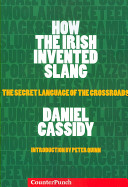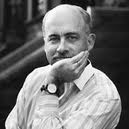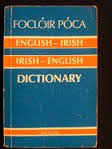It is well known that for many, many years, the Irish in America were seen as second class. They were laborers, house maids and lived barely above the status of slaves. Often, because of their Catholicism, they were treated worse.
Daniel Cassidy (above), author of “How the Irish Invented Slang” at a bar in New York City.
Irish-Americans have come a long way since then, but there are still some things that have yet to be fully unearthed within the Hibernian/Gaelic culture separate from the Anglo-Saxon/English culture. Of course, there are not many things more relevant when talking about culture than language, for which the Irish has a long and successful history, whether oral or with the pen.

In 2007, a book supported by a left-leaning publisher (CounterPunch) did much to open the flood gates to the great influences the Irish had on the English language in the United States. And with this Irish pride came the old Anglo-American discriminations that were once so powerful in the form of the Know-Nothing Party, policies against hiring Irish at the workplace and the Nativist burning of Catholic churches in America.
When Daniel Cassidy’s "How the Irish Invented Slang: The Secret Language of the Crossroads" came out, the research behind it was called “casual, off the cuff.” And that there was “no scholarship or real evidence at all in it.”
It’s premise was called “baloney,” yet in the end, we have found the only baloney was the lack of research into the influence Gaelic-Irishhad on the English language by the supposed diligent dictionary-makers like Oxford and the Anglophile American versions such as Merriam-Webster.
“Daniel Cassidy flings down the gauntlet to all those compilers of dictionaries who fled to the safe haven of ‘origin unknown’ when confronted with the challenge of American slang,” said Joseph Lee, Professor of Irish Studies at New York University.

Peter Quinn (right) is an Irish-American Historian, author of “Banished Children of Eve” and was an advisor to Martin Scorsese on the film, “Gangs of New York.”
“He has brought back to life that which was considered dead and settled,” said Historian Peter Quinn.
“Imagine old, sunken roads re-surfaced on our maps,” Publisher Alexander Cockburn said.
Even as the cloistered British professors and American Anglophiles tried disassembling Cassidy’s evidence, the research ended up becoming a breakthrough that stifled the English language protectorates. These Oxfordonians would much rather avoid admitting any influence on the English language such as slang that came from the tenant farmers in Ireland that were exiled to American cities like Boston, Philadelphia and New York where, on the city streets, the secretive slang of rebels and thieves reached up into daily usage.
When the "How the Irish Invented Slang"won the 2007 American Book Award for nonfictional, it was settled. Although some research still needed to be done to have multiple sources, it was established that the Irish language had had a profound and previously undocumented influence on the English language.
Unearthed by Cassidy’s studying of a Foclóir Póca, or Irish-English pocket dictionary along with the skills produced by studying the language and history of the Irish in his position at the head of the Irish Studies program at New College of California, Cassidy uncovered lingual gems such as the word “crony.”
pocket dictionary along with the skills produced by studying the language and history of the Irish in his position at the head of the Irish Studies program at New College of California, Cassidy uncovered lingual gems such as the word “crony.”
Previously, the Merriam-Webster Dictionary speculated that the wordcrony came from Greek etymology, but Cassidy points out that it comes from the Irishcomh-rhogna (pronounced co-rony) which means “fellow favorites,” used often in and around Tammany Hall and the poker tables of the port cities where the Irish traditionally worked as longshoremen and laborers.
The perfect translation from the Irish to the English seems obvious for words like “crony,” even to those who have never studies linguistics. Combine that with the old cultural discrimination and refusal of all things Irish by British and Anglo-American rule makers, and today’s culture of empowered political correctness and "How the Irish Invented Slang" became a wonderful controversy for all those who questioned HL Mencken, author of The American Language, when he said the Irish had contributed very few words, “Perhaps speakeasy, shillelagh and smithereens exhaust the list.”
Mr. Cassidy’s work was groundbreaking (Here he is talking about his book). But it didn’t all come from research and study, it also came from his own family. His growing up in an Irish Catholic home in New York City had a lot to do with it too. In fact, much of his research at the New College of the University of California had to with genealogy. For Cassidy, whose lineage was traced back to the Irish Famine of the 1840/1850s and subsequent emigration to America, it was personal.
“Even growing up around it, little shards of the language stayed alive in our mouths and came out as slang,” Cassidy told the New York Times (NYTimes review linked).
As a child, he was nicknamed “Glom.” When he asked why Glom, his family responded, “because you’re always grabbing other people’s stuff.” (Here he is talking about being called Glom)
Glom or glaum in English translates as “glam” in the Irish and means “to grab, to clutch, to grasp.” Which now is obsolete in English, but was once used regularly, as in this April 15, 1912 San Francisco Bulletin article, “It may have been the Easter season… but tis a fact, ‘Chic’ Hartley actually broke through his shell yesterday and glommed a couple of hits.”
In researching "Light of the Diddicoy," the first book in the Auld Irishtown trilogy, I uncovered many fascinating things about my own Irish background and how separate and different a culture Irish-Americans truly had from the incumbent Anglo-Americans. But nothing was as astonishing to me as the influence of the Irish language on American street slang. It opened my mind to the voice of the narrator of my book, Liam Garrity, and had a profound affect on the way his story needed to be told, the words that he would have used circa 1915/1916 and the underscoring of the underground nature, or anti-establishment and anti Anglo-Saxon culture of Irish-Americans.
In fact, I found some of the words in Cassidy’s work being used by real gang members of the era in the many newspaper articles and police reports I sifted through. Finding out that these words, which were so embedded in the American city street language had Irish origins, for me, was amazing:
Stool pigeon English – “a police informer,” Irish (steall beidean) – “a falsely accusing informer”
Growler English – “a can used to carry fresh beer home from a saloon,” very popular in New York, Irish (gearr-ol ur) – “a fresh quick drink,.”
Spalpeen English – “a common workman, scamp” Irish (spailpín) – “itinerant farm worker, scamp”
Dude English – “a dapper dandy,” Irish (dud) – “a foolish looking fellow,” which explains how the poor Irish immigrants saw the rich Americans. “Dude” is still in affect today, however it means “a regular guy,” which falls between the variants.
Shanty (Irish seantigh) “an old house”
Ballyrag (Irish bollaireacht) “a boaster, a bully”
Slugger (Irish slacaire) “to beat or hit hard,” think: Babe Ruth, 1920s
Racket (Irish raic ard) “a loud uproar”
Helter Skelter (Irish Ailteoir seaoilte) “an uncontrolled wild prankster”
Ground Sweat (Irish grian suite) “a grave”
There are so many more that I simply cannot name them all, although I left a list of a few below to interest you.
The fact remains today that, even as we continue to confront old and outdated discriminations on many fronts, we still have so much more work to do. Even though it is 2013, we still have women in the working place making less than men, African-Americans grossly outnumbering whites in prisons and American Hispanics still not being accepted within the culture.
After winning the American Book Award, Mr. Cassidy died of cancer. It was a great loss, but what hurts even more is that his work has not been taken up by another university and no scholarship or funding has been secured by Irish-American organizations to continue this valuable research.
“It’s unfortunate,” Peter Quinn explained in an email to me. “But as far as I know no one has continued with Danny’s explorations. Danny was the first to say that his work was meant as a beginning rather than an end. He was eager to start a group project but died before it could get underway.”
- Baloney – Béal Ánna, “silly, foolish talk”
- Boss – Bás, “boss, best, very good”
- Brag – Bréag, “a lie, exaggeration, deception”
- Cop – Ceap, “a protector or chief.” The verb “ceap” has meanings including to catch or intercept.
- Daddy – Daidí
- Gab – Gab, “a chattering mouth”
- Goon – Guan
- Hick – Aitheach, meaning a peasant, a churl
- Jazz – Teas, meaning heat, passion, excitement
- Lucre – Luach Áir, “reward of gold
- Shack – Teach, “house”
- Eighty-six (as in remove, like from a menu) – Eiteachas aiocht “denial, refuse”
- Slob – Slab, “dirty or slovenly person”
- Smashing – ‘s maith sin, meaning “it is good”
- So long – Slán
- Buddy – Bodach, “a clown, churl”
- Drag (as in race) – De raig, “sudden acceleration”
- Poker – Poca, “pocket game”
- Jack (as in money) – Tiach, “a small purse, money”
- Finagle – Fionna aclai “an ingenious invention, contrivance”

You need to be a member of The Wild Geese to add comments!
Join The Wild Geese